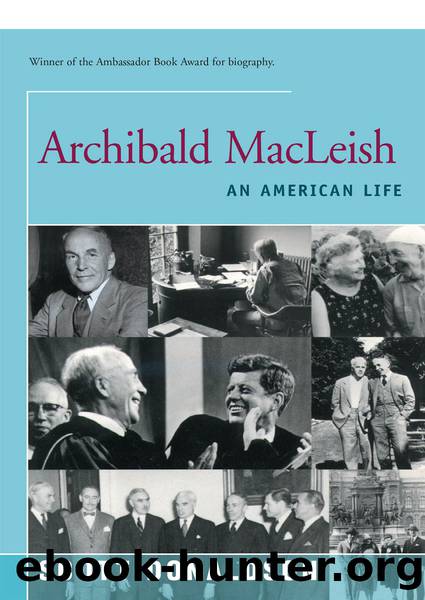Archibald MacLeish by Donaldson Scott;

Author:Donaldson, Scott; [Donaldson Scott]
Language: eng
Format: epub
Publisher: Open Road Integrated Media, Inc.
Published: 2016-05-05T00:00:00+00:00
⦠try it at River Rouge with the Ford militia.
Try it if Mister Fordâs opinions are otherwise,
Try it and see where you land with your back broken â¦
In Land of the Free, MacLeish attempted to find words for the purgatory of the depression, for what had happened to American hopes and expectations. The voice that utters his words is all but defeated. âIt was pretty hard to feel any hope about those people,â he said. âThey felt very little about themselves.â Nonetheless, there is a hint that the skies may clear at the end. The last four pictures show a May Day procession, a union meeting, the celebration of the end of a strike, and a Dust Bowl farmer.
We wonder if the liberty is done: â¦
they ask. Then, they speculate, perhaps âthereâs liberty a man can mean thatâs / Men, not land.â And finally they end in doubt:
We wonder
We donât know
Weâre asking.
Reviews of the book all remarked on the power of the photographs. As Archie later said, the âcameras caught something more than just eroded land. They caught eroded human beings.â As for MacLeishâs âsound track,â one critic thought it somewhat contrived, yet another so admired its fusion with the photographs that he thought the book âought to be got into the hands of every man, woman, and child in the United States.â
Yeats, Frost, and âPublic Speechâ
In the spring of 1937, Archie spent six weeks at Princeton as âa visiting member of the faculty.â His duties, as envisioned by Dean Christian Gauss, involved giving a series of lectures on contemporary literature, meeting informally with students in groups to discuss aesthetic and political controversies, and seeing them individually to critique their writing. This âpoet-in-residenceâ experiment, financed by the Carnegie Corporation, proved less than satisfactory. One problem was that MacLeish was on campus for only six weeks, and only in the evenings, since he continued his Fortune duties during the day in New York. Another was that the students who turned out for the evening lectures and open houses and consultations received no academic credit for their time and effort. Nonetheless, the university and the poet parted friends. MacLeish gave Princeton the manuscript of his play Panic as a farewell gesture.
To his alma mater, Yale, in December 1937, he made the more substantial gift of the manuscript of Conquistador. The next month, on January 7, 1938, he presented the Francis Bergen lecture, âPublic Speech and Private Speech in Poetry,â to a packed audience at Sprague Hall. The same day, an exhibition of his works opened at the Yale University Library, with a catalogue prepared by Arthur Mizener. With wry modesty, Archie downplayed the exhibition. âThere is a point beyond which mediocrity cannot be inflated to look like the real thing,â he wrote, âand I think that point has been well reached at Yale in the Rare Book Room.â What he had to say in his Bergen lecture, however, was dead serious and from the heart.
âPublic Speech and Private Speech in Poetryâ represented MacLeishâs most extended endorsement of the need for artists to speak with a public voice.
Download
This site does not store any files on its server. We only index and link to content provided by other sites. Please contact the content providers to delete copyright contents if any and email us, we'll remove relevant links or contents immediately.
| Actors & Entertainers | Artists, Architects & Photographers |
| Authors | Composers & Musicians |
| Dancers | Movie Directors |
| Television Performers | Theatre |
Cecilia; Or, Memoirs of an Heiress — Volume 2 by Fanny Burney(31956)
Cecilia; Or, Memoirs of an Heiress — Volume 3 by Fanny Burney(31942)
Fanny Burney by Claire Harman(26603)
We're Going to Need More Wine by Gabrielle Union(19046)
Plagued by Fire by Paul Hendrickson(17412)
All the Missing Girls by Megan Miranda(16027)
Cat's cradle by Kurt Vonnegut(15355)
For the Love of Europe by Rick Steves(14121)
Bombshells: Glamour Girls of a Lifetime by Sullivan Steve(14075)
Leonardo da Vinci by Walter Isaacson(13336)
4 3 2 1: A Novel by Paul Auster(12392)
The remains of the day by Kazuo Ishiguro(8999)
Adultolescence by Gabbie Hanna(8927)
Note to Self by Connor Franta(7671)
Diary of a Player by Brad Paisley(7581)
Giovanni's Room by James Baldwin(7346)
What Does This Button Do? by Bruce Dickinson(6207)
Ego Is the Enemy by Ryan Holiday(5448)
Born a Crime by Trevor Noah(5382)
